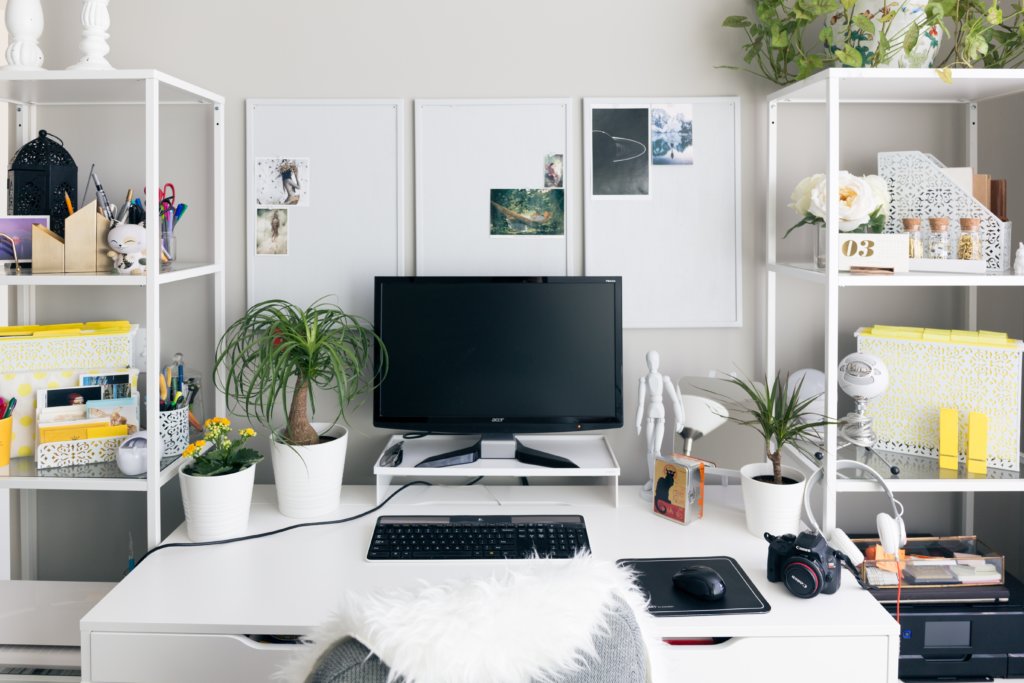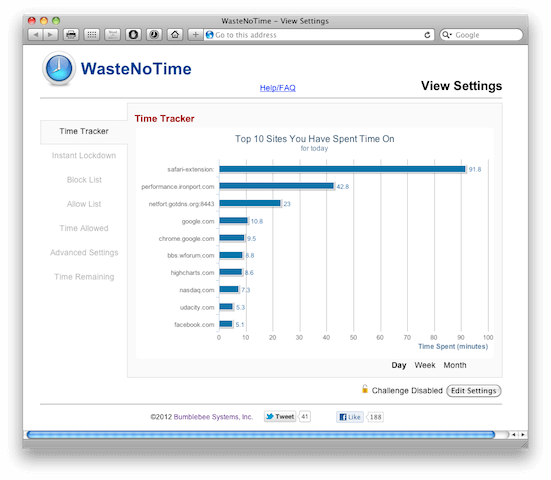Now that Labor Day has passed and school is back in session, the frivolous days of summer are unofficially over, presenting some unique challenges for those who work and study primarily in their homes.
For students coming off a long summer break, it can be difficult to transition back into “school mode” and get used to studying at home again. And for those who work a remote job, the diminishing daylight and colder weather can impact productivity and make it easier to turn into a hermit.
To make the transition to fall easier, we’ve put together some tips on maximizing your productivity, happiness and health while working and studying from home.
No matter what the size of your apartment or the type of work you do, these ideas will help you create a better workspace and stay focused so that your time spent working at home is more effective and enjoyable.
Increase Your Productivity Working & Studying At Home
Create a Comfortable & Organized Workspace
- Set up your desk in a corner of your apartment or house with minimal distractions and a door that can shut. Ideally, it wouldn’t be in your bedroom, but if you live with roommates this is probably the only practical place. If you’re setting it up in the bedroom, avoid having it right next to your bed and try to create some sense of separation from the rest of the room — perhaps by putting a rug under the desk.

- If you’re on a budget, a cheap desk is fine, but splurge on a comfortable, ergonomic desk chair. If you’re not comfortable when you’re working, you won’t want to work — plain and simple. You’ll also stay more focused and feel less sore and tired if your back is well supported and your neck isn’t strained.
- If you have extra to spend on a desk, consider an adjustable standing desk. Standing desks are designed to be able to be used standing or sitting. Studies show that standing during work can increase productivity, improve your health and keep you more alert during the day.
- Position your desk in a place where you can get some natural light — but not so much that you’ll be squinting at your computer or dealing with annoying glares during the day. Natural light has been shown to improve worker well-being, creativity and productivity. If your apartment doesn’t get much natural light, particularly during the winter, it may be worthwhile to invest in a Sun Lamp to help you fight the winter blues.
- Keep your workspace organized and clean. A messy, disorganized work area can make you feel disheveled as well. Take note of our cable management tricks to keep your cords organized and condensed. You can even mount a pegboard under your desk to keep electronics and wires out of sight. If you have a lot of papers and/or books, installing bookshelves above your desk can help you avoid cluttering up your space while providing easy access from your desk.
- Hang a whiteboard calendar or bulletin to highlight important deadlines and events. If you’re taking lots of classes or are managing multiple projects, having something to help you visualize your schedule right in front of you can help you stay on track and avoid procrastinating. It’s also a lot easier to miss a note in an electronic calendar than a deadline that you’ve been staring at on your workspace wall for weeks.
- If you’re able to (without forfeiting your security deposit), paint your office walls. Research has shown that color can have a major impact on your productivity and happiness. While blue is generally considered to be the most “productive” color for mind-intensive tasks, different colors affect your mind in different ways, and the type of work you’re doing may be better suited for a different color. Yellow is considered better for creative work, while green can help you feel balanced and calm. Your best bet is considering how you want your mind to be affected while in your workspace. Keep in mind, though, that if your workspace is in your bedroom, you’ll want to avoid colors that are overly stimulating, as they can affect your ability to relax and sleep.
- Decorate your workspace with things that make you feel happy and motivated. Put pictures on the walls, frame inspirational quotes and decorate your desk with colorful supplies and small personal knick-knacks. Hanging photos on a wire is also a great way to decorate your workspace while minimizing clutter around your desk and improve your mood by reminding you of fun times with loved ones.
- Consider getting a couple of indoor plants for your work area. They’re low maintenance and inexpensive, but can provide some major work benefits. Several studies have found that studying or working around plants improves concentration and productivity and can increase memory retention up to 20 percent, according to the University of Michigan. Other studies found that working around plants increased workers’ accuracy rate and students’ attentiveness. Plants have also been shown to improve people’s overall well-being, lower stress and increase job satisfaction.
Stay Focused While Working
- Invest in noise-cancelling headphones. These are pretty much a must if you live with loud roommates. Even if you don’t, noise-cancelling headphones are ideal for taking business calls and blocking out noise so you can stay focused no matter what’s going on inside or outside your home Listening to certain types of music while working can also improve creativity, mood and productivity for many people. Just keep the music mellow to avoid getting distracted.
- Use productivity tools to help you stay focused on your work. If you find yourself getting distracted by social media or other websites when you’re working on the computer, there are plugins you can install directly into your internet browser that allow you to see exactly which sites you’re spending the most time on and how long you’re spending. The WasteNoTime plugin has an Instant Lockdown feature that allows you to focus on your work for a period of time with limited Internet access. You can also automatically block selected websites as soon as you have spent a predetermined amount of time on them each day. With all of the distractions available to you on the internet, tools like these can help you maximize your productivity and avoid falling into internet rabbit holes.

- Use computer software to limit blue light at night. If you work on your computer or iPad at night (as many students do), you should definitely install screen-dimming software, such as f.lux. f.lux adjusts the color of your computer’s display to the time of day — warm at night and bright like sunlight during the day. It’s unnoticeable during the day, but the warmer display at night helps reduce eye strain and reduces the negative effects of staring at a screen late at night by filtering out “blue light” that can mess with your body’s natural circadian rhythms. This prevents the computer light from keeping you awake, allowing you to sleep better once you settle in for the night.
- Keep your cell phone on “Do Not Disturb” or turn it off so you’re not tempted to look at it while working or studying. Hearing or seeing your phone light up from the constant notifications from messages and alerts can make it very difficult to focus on work. Putting it on “Do Not Disturb” will help you avoid the distraction of checking it too often. If you don’t need it nearby, consider putting it in a separate room until you’re done. Have strict limits for when you will check it — such as once in the morning, at lunch and after you finish your work, rather than every time you take a break from work.
- Avoid constantly checking your email. This can be a tough one for those who work remotely, but if you can avoid it, you’ll be much more productive. According to Forbes, the average person checks their email about 15 times per day. But they report that a recent study from researchers at the University of British Columbia found that when people were limited to checking their email just three times per day, their stress levels decreased significantly, and they felt that they were more able to complete their most important work. This is important not just from a work-life balance perspective, but also for keeping focused on your tasks, rather than getting distracted by constant new messages. Instead of checking your email multiple times an hour, choose two or three times in the day to go through emails and actually process and deal with them. You’ll get more done and feel more accomplished, and you’ll be able to better focus on your other tasks.
Take Productive Breaks
- Take a short break every hour or so. Get up and walk around your apartment, stretch a bit, or even perform a set of home exercises if you’re feeling sluggish. Getting your heart pumping will help keep you focused and alert during the day. You can also do some self-massage with a foam roller — they’re great for getting at those sore back and shoulder muscles you can get from leaning over to write or work on the computer. When taking a break, avoid turning on the television or getting distracted by household chores — leave those for after you’ve finished whatever you’re working on.
- Even better, try to get out of the house for a short time during the day. Even if it’s just grabbing a coffee down the street or going on a short walk around the block, getting some fresh air and sunshine, along with some social interaction, will help you re-focus and energize you for the rest of the day. It can be difficult to get out during the winter, but studies from the University of Michigan show that going outside, even in the cold, can improve your memory and attention.

- If you really can’t make it out of the house during the day, you can get similar benefits from looking at photos of natural settings. The same study also showed that when looking at photos of nature, students’ memory and attention scores improved by about 20 percent, the same amount as when they went on a one-hour walk through an Arboretum.
- Keep your kitchen stocked with healthy snacks you can grab quickly, such as fruits, veggies, hummus and nuts. Not only will eating healthy make you feel better; you’ll be more productive and have more energy. Don’t bring food into your work area, though — you’ll feel better and eat more mindfully when you take the time to sit at the table, even if it’s only for a short time.
Have other tips and ideas on staying focused while working at home? Let us know in the comments below.

 Fair Housing Notice
Fair Housing Notice 